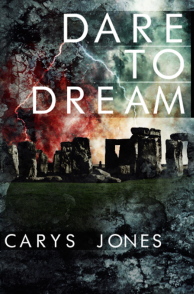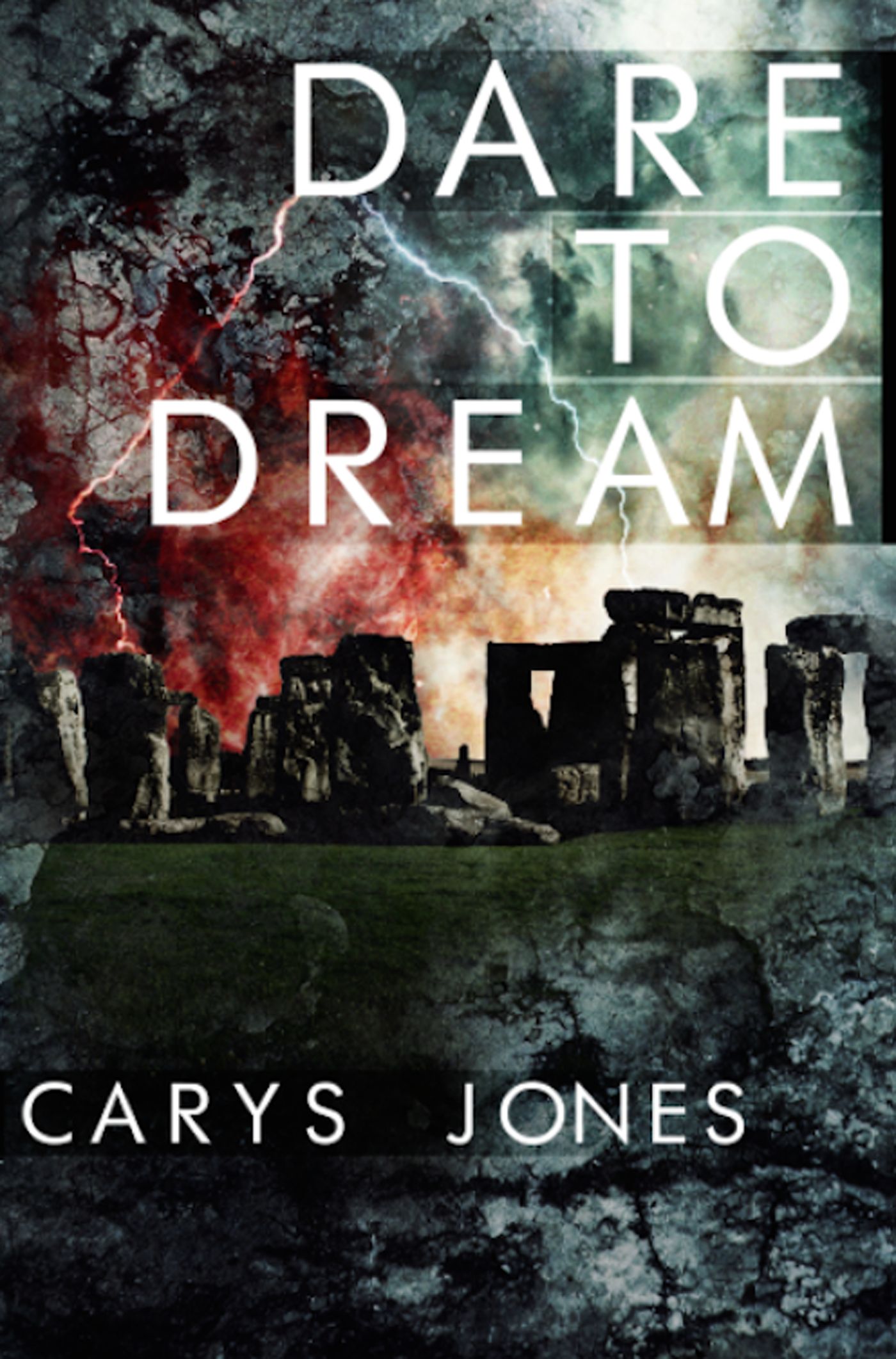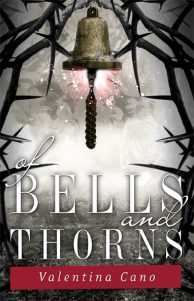Dare to Dream (Carys Jones)
$4.99
“The world was going to end. Of that, Maggie Trafford was certain.”
Fourteen-year-old Maggie Trafford leads a normal life. Well, as normal as being crammed in a three-bedroom house with four siblings and a single parent can be, anyway. But despite being somewhat ignored at home, Maggie excels, earning top grades, a best friend who would do anything for her, and stolen looks from a boy in Maths.
It’s not until the dreams start that Maggie realizes “normal” is the least of her problems. Every night, she lives the same nightmare—red lightning, shattered glass, destruction. But nightmares are just that, right? No one believes her when she says it’s an omen. At least, not until the already mysterious pillars of Stonehenge start falling.
No longer alone in her fear, Maggie and the world watch with bated breath as one after another, the historic stones tumble, like a clock counting down. But only Maggie knows what it means: when the last stone falls, destruction will reign. And when the world ends, there’s only one option left—survive.
Horrifying and raw, Dare to Dream is equal parts tragedy and hope, detailing the aftermath of apocalyptic catastrophe, the quest for survival, and the importance of belief.
Additional information
| Format | ePub (Nook), Mobi (Kindle), Paperback, PDF (Other) |
|---|
Read The First Chapter
One
The bell screamed out to the delight of hundreds of defeated children, signaling the end of yet another school day. Maggie Trafford rose slowly from her chair, carefully dropping her belongings into her purple backpack. Once done, she slung it over her shoulder and followed the mass exodus that was erupting out of the cold, hard, grey structure which, for five days out of seven, she was forced to attend religiously.
Bainbridge Wells High was a typical English secondary school, packed full of students—some capable, some not so much, none particularly eager to learn. When the bell tolled at three, a sea of blue blazers would swarm out and quickly dissolve into the surrounding council estates. It wasn’t a particularly nice location: it wasn’t urban, nor was it rural, and it wasn’t nearly pleasant enough to be labeled the suburbs. The few privileged children who weren’t bright enough to attend the more prestigious schools lived far away and would be escorted from the dreary estates by car, the drudge and monotony of school life soon a distant memory—at least until the next morning. Those students who could walk home generally lived in modest dwellings. Council housing was cheap and cramped; Maggie’s home was no exception.
Head down, she began the familiar walk, alone as always, as her only true friend, Dawn Brady, was one of the luckier ones. Her dad would always be there waiting outside the school gates; she would climb into his shiny BMW and be gone, waving at Maggie, who would watch her leave with a heavy heart, envious of her ability to get away. Maggie’s family didn’t even own a car—her father had taken that when he left nine years ago—when she was just five years old. He’d disappeared without so much as a goodbye, leaving her mother to raise five young children. Anywhere else, it would have seemed a sad tale, but for the students at Bainbridge Wells High, a troubled upbringing was commonplace.
It was only a short walk from school to her house, which, on cold days like today, she was actually grateful for. It was probably just about the only thing she was ever grateful for. The wind pinched at her cheeks and whipped her curly black hair around in an angry fury as she shielded herself within her coat and turned the corner onto her street. The number of students around her was dwindling now, with just a few stragglers still heading back. She walked around a group of guys she recognized from her science class who were huddled conspiratorially together, probably indulging in a forbidden cigarette. They didn’t speak to her as she shuffled past. A few weeks previously, Maggie had caught her older brother Jack smoking in a similar spot on the street. When she’d informed their mother, she’d told her that she didn’t have time to worry over such things—Jack was sixteen and old enough to make his own decisions. For her troubles, Jack had punched her so hard in the ribs that she’d been bruised for at least three days. She’d only told Dawn about it, but Dawn didn’t understand since she was an only child. Dawn’s lack of siblings was yet another reason to envy her friend.
Maggie unlocked the gate and wandered down the short path, but paused before opening the faded green front door, enjoying one last moment of tranquility before entering the inevitable chaos inside.
Sure enough, the moment she entered the warmth of her house, she was greeted by a waterfall of noise. Upstairs, music raged loud enough that the floorboards vibrated. Her mother was yelling from the kitchen for one of her brothers to turn it down as she sweated over a hot stove, preparing dinner for her five hungry children. Maggie was the middle child: she had two older brothers and two younger sisters, yet even in a family that full, she always managed to feel alone and isolated.
“Jack, Kyle! Whichever of you is making that racket, turn it down!” Maggie’s mother threw the kitchen door open, hot and bothered and clearly annoyed by her sons’ inconsiderately loud music. She glared angrily at the ceiling, brandishing her baking spoon like a weapon. Angie Trafford was in her late thirties, but she appeared much older. Raising five children single-handedly had taken its toll, and she looked haggard, her eyes forever shrouded by dark shadows. It pained Maggie to see her mother like that, but there was little that could be done: they had no money and could just about survive day to day.
“Oh, hey, Mags.” Angie managed to smile at her eldest daughter when she noticed her standing quietly in the hallway.
“Mum! April is in the bathroom and won’t let me in!” Catherine, the youngest of the tribe, came storming down the stairs, her pretty face contorted in anger. She was ten going on twenty, already wearing makeup and lusting after boys. It was only at times like this, when she wasn’t getting her own way, that she tended to act her age.
“April! Get out of the bathroom!” Angie cried up the stairs, struggling to be heard over the din coming from the boys’ bedroom. Above them, a door slammed, but April didn’t surface. Maggie sighed, shoved past her youngest sister, and headed up to the bedroom which the three girls shared. At least, if it was currently unoccupied, she could get a few moments of peace and quiet. In a house as cramped as hers, it was a rare treat to be able to steal a moment alone.
Her bedroom wasn’t a sanctuary for very long. Catherine came bounding in after her, pouting and clearly still annoyed.
“She’s been in there ages,” she moaned.
“I’m sure April will be out in a minute.” Maggie assumed her usual role of peacekeeper. She felt like she was forever trying to restore some sort of calm to stop her siblings from murdering one another. They could all be extremely volatile—the close proximity in which they existed did nothing to help an already fragile situation.
“Can’t you just go and tell her to get out?” Catherine whined, flopping down beside her older sister on her bed.
“No.”
“Why not?”
“Because I’m busy with my own stuff. I’ve got homework to do. If you want April out of the bathroom, go get her out yourself.”
“Homework?” Catherine spat out the word in disgust.
“Yes, homework, Cat. It’s important—you should try doing yours sometime.”
“You are such a swot.”
Maggie sighed wearily; she was in no mood to be dragged into a juvenile war of words with her little sister. Luckily, she was saved from having to respond when the bathroom door at last creaked open and Catherine raced off to get in before anyone else could. Rather than Maggie being alone, however, April came in to replace the now absent Catherine and in an equally foul mood.
“God, Catherine can be such a brat.”
“So can you.” Maggie didn’t look up when she addressed her, preferring to concentrate on her open maths book and attempting to do some homework.
“Jeeze, Mags, you sound like Mum.”
Maggie rolled her eyes, but refused to look up or even answer. April quickly grew tired of talking to her sister and so wandered off to find a more willing audience for her moaning. Maggie was thankful to be alone, even though she knew it wouldn’t last long. She’d barely finished her page of fractions when her mother yelled up the stairs that dinner was ready.
Meal times were perhaps the most chaotic moments of all. The family was forced to cramp six seats around a table meant for only four, which meant that an awful lot of pushing and shoving occurred. Maggie would have been much happier eating her dinner alone upstairs, but her mother insisted on them all dining together in an ill-judged attempt at creating some family unity. The boys were always first to the table and would wolf down their food as if they hadn’t eaten in weeks. The girls talked as much as they ate, which meant that they took longer. Their mother always began by attempting polite small talk, asking each of them how their day had been, but it always somehow managed to erupt into a huge argument and dinner would end with people leaving the table angrily, followed by a succession of slamming doors. Once, Jack had punched Kyle over a dispute at school that they hadn’t managed to settle during the day. Their mother had cried that night.
This mealtime played out like all the ones before it: this time, it was Catherine and April who were having a heated exchange over their spaghetti bolognaise. The argument reached a head when Catherine called April a slut, to which April’s reply was to throw the remainder of her dinner over her sister’s head. It was a typical dinner in the Trafford household. Maggie began cleaning away the dishes while her mother wiped clean a sobbing Catherine. April, not wanting to be disciplined, had slunk off during the chaos to her friend’s house across the street. It was unlikely that she would return that night.
With dinner having drawn to a dramatic conclusion, the family had dispersed for the evening. Catherine was with their mother in the small living room, watching the soaps, while Jack and Kyle had gone out to meet friends and play soccer, which seemed dubious considering how cold and dark it was. Maggie was pretty certain that they had gone somewhere with much less noble intentions, probably to drink cheap cider and smoke cigarettes, but she had learned what happened when she told of their plans, and so, she kept quiet. Now that the house was relatively empty, she could at last relax and begin to unwind after a hectic day. Maggie chose to have a bath: it was one of her favorite things to do. She loved nothing more than to lie amongst the warm bubbles and let her mind wander. It offered her a rare chance to be alone and was more often than not the highlight of her day.
She began filling the bath and watching with excitement as the porcelain tub filled up with warm water and bubbles. The whole room became scented with lavender, and she could already feel herself starting to relax. As she got in and felt the warmth surge through her, it was as though she was stepping through a gateway, leaving the stress and worries of her life behind and entering a place of peace and tranquility. She lay back, smiling, and felt her eyelids beginning to grow heavy.
A tremendous crash suddenly jolted Maggie awake. Shock waves were still vibrating through the air as her eyes flew open. It sounded as though a tree had just snapped in half outside. Terror stiffened her limbs and made her sit bolt upright. Through the bathroom window, she saw that the sky was now dark and heavy, but there was something disrupting the darkness. A brilliant flash of red lightning scorched down to the earth. It was so surreally intense in color that Maggie blinked in disbelief when she saw it. But then it came again, crashing down a few feet from where it had previously been. It was as red as a heated poker within a fire, but much more deadly. With each flash, a part of the world below fell away, turned to dust. She could feel the walls around her shaking, and beneath her the base of the bathtub began to crack.
“Mum!” Maggie called out desperately, but her voice was drowned out by the commotion outside, where people screamed in terror as the sky was torn apart by yet more red flashes. The bathroom walls continued to shake ferociously as the relentless red lightning rained down. Maggie could hear the sheer panic released in anguished cries as people desperately tried to run, but their efforts were in vain. Places she knew—neighbors’ homes, school—were gone in an instant. The heavens blackened with a sickening malice.
Maggie’s heart was racing madly in her chest, threatening to burst out through her rib cage. She could hear its relentless beating echoing in her ears.
“Mum!” she screamed, so loud her vocal chords stung. What was happening? Everything outside was suddenly being ripped apart and she had no idea why.
The bathroom window cracked, and the bathtub shifted uneasily, causing the water to become displaced and begin swirling like a tempest. Maggie gazed helplessly at the window as it continued to splinter before her eyes, and just as it was about to impact in upon her, she awoke, gasping, terrified, shocked to find that she was in her bathtub, surrounded by water that was now tepid.
Maggie splashed about, trying to regain her senses. She was shaking as she hauled herself out of the tub and wrapped herself in a towel. In her mind’s eye, she continued to see the red lightning and the obliteration of everything she knew. It couldn’t have been a dream—it had felt so real. She’d never experienced anything like that before. She went to her bedroom window, sure that she would look out and see a world charred and destroyed, but everything was as it always had been. Nothing had changed. Unsettled, she began to blow-dry her hair, hoping to also blow away any remnants of what was easily the most horrific dream she had ever had.
The following day, as Maggie walked to school, she tried to dismiss the nightmare from the previous evening, but it refused to leave her mind. As she wandered down the familiar streets in the cold morning air, she could still envisage the horrific red flashes tearing down and wiping everything away as if it was all nothing. She shuddered as she recalled the vicious images and huddled herself tighter within her coat.
She’d struggled to sleep after her eventful bath time. Each time she closed her eyes, the nightmare returned, vivid and real. It terrified her. She’d texted Dawn in the early hours, briefly describing the terrible dream and how it was keeping her from sleeping. She kept tossing and turning, constantly restless. Not that April and Catherine noticed—if the end of the world did come, they would just sleep right through it. The pair of them had to be literally dragged out of bed every morning, kicking and screaming. The only time they were calm was when they were sleeping. Maggie was always the first up in the mornings, eager to be out and on her way before the chaos began. Occasionally, she’d help her mother get her sisters up, but usually, she was long gone before they had to be up and about as thankfully, since Maggie’s school year were preparing to take their public exams, she was allowed early entry to the library. It was time that she used well, catching up on homework and enjoying some much needed peace and quiet.
Only Dawn understood. Her father had to drop her off early so that he could get into the city on time for work, so she would meet Maggie in the library, and they would sit and work together. But no one mocked Dawn for being in school early. Her blonde hair, blue eyes, and ample bust were a passport for popularity. All the boys fancied her, and all the girls admired her. It always puzzled Maggie that they were best friends, as they were poles apart from one another in each and every way.
“So, no sleep, huh?” Dawn came in and casually slung her designer satchel across the table Maggie was currently working at. The air around her smelled like marshmallows.
“No, not really,” Maggie grumbled, wiping her eyes.
“That’s too bad. You should take sleeping pills—my mum swears by them.” There were few prescription drugs that Dawn’s mother didn’t swear by.
“I’m sure I’ll be okay tonight. It was just a really bad nightmare.”
“Yeah, nightmares can be rough.” Dawn leaned forward and cast a skeptical eye over the work Maggie was doing.
“Maths?”
“Yes.”
“For Johnson’s class?”
“Yes.”
“God, he works you guys really hard.” She continued to scan the list of equations her friend was trying to work through. “I don’t know how you cope being in top set.”
“I like maths.”
“Geek.” If it had been anybody else making the remark, it would have come across as cruel, but Dawn said it with love and affection. It was almost a term of endearment between them. She admired Maggie for her intellect and envied it as an acute mind would always be something that was beyond her reach.
“So, why was your nightmare so bad?”
Maggie watched Dawn rummage in her bag for a notebook, aware that it was only posturing. Dawn would have no desire to work that early in the morning. She never did.
“It was just . . .” It was hard to find the words to describe what made it quite so awful without sounding like a crazy person. “It felt really real, that’s all.”
“Uh huh.” Dawn had begun flipping through a copy of Hamlet in preparation for her English class that morning.
“What was it about?” Her interest in the dream was visibly waning as her mind struggled to adapt to Shakespeare’s language.
“The end of the world.”
Dawn looked up, surprised. “Gosh, that’s heavy, Maggie.”
“Mmmm.”
“It’s just a dream, though, don’t let it get to you.”
“I know, I won’t.” Maggie returned her attention to her maths work, grateful for the distraction.
The two girls were silent for a few minutes, each absorbed in their own studies. But Dawn quickly tired of her work and couldn’t resist striking up another conversation.
“I’m guessing that you didn’t see Hartford’s Place last night?”
Maggie didn’t even look up as she shook her head in reply. Hartford’s Place was a popular teenage show about a wealthy American school which was full of handsome guys and cute girls. Most of her classmates watched it, but Dawn was completely addicted. She had posters of the stars of the show all over her bedroom walls and owned all four seasons on DVD as well as the soundtrack on CD. Whenever Maggie went to her house, Dawn would force her to watch at least two episodes. It wasn’t a terrible show; it was just a little too predictable for Maggie’s taste. Plus, she found it hard to follow as she wasn’t allowed to watch it at home. Catherine and April were too young for it to appeal to them, and in the Trafford household, the majority always held the vote when it came to the television. Occasionally, her brothers had put it on, but their attention span struggled to last the entire forty-five minutes of an episode.
“It was such a good episode,” Dawn prattled on. “Eddy cheated on Amber with Caroline, but Amber doesn’t know . . . yet . . . but Mercedes saw and is bound to tell . . .”
Maggie tuned out her friend’s rundown of Hartford’s Place so that she could concentrate on her work. It was a skill she had been forced to acquire during their friendship, else she would never be able to get any work done. Dawn was in full flow, oblivious to the fact that Maggie was no longer listening, when the bell screamed out all around them, signaling the start of yet another mundane school day.
“Urgh,” Dawn sighed angrily. “I suppose I had better get to class. Catch you at break?”
“Yeah,” Maggie mumbled in reply. She completed her last equation just as the bell died away.
The school day unfolded, following the same monotonous pattern. Maggie trudged along with her peers from one class to the next, to be taught by disillusioned, bitter teachers who were as equally resentful as their students for whatever misfortunes in life had led them to end up within Bainbridge Wells High. The only class which Maggie even remotely enjoyed was Mr. Johnson’s higher maths group. He was young, enigmatic, and passionate, which made him hugely popular. He had also retained some of his boyish good looks, so he was never short of admirers within the student body. Maggie genuinely enjoyed mathematics, but having Mr. Johnson for a teacher made it all the more enjoyable. She got a thrill when he complimented her on good work; it drove her to make sure that she always performed to the best of her abilities when she was in his class.
But Maggie would have to wait until the last lesson of the day to see Mr. Johnson—before then, she had to endure home economics, chemistry, English, history and French. They weren’t subjects that she particularly hated; if anything, she was indifferent toward them. The lessons and the classrooms changed, but for Maggie, the day would remain the same: she would always end up sitting alone. She felt as though she were a loner through choice, in that she didn’t really enjoy company, perhaps because her family life was bursting at the seams. Sometimes, she just enjoyed being alone. The only person she really bothered with at school was Dawn, but the only class they shared together was physical education. That was a good thing, though. Dawn loved to sit and gossip in class and was forever being given detentions for it. Alone, Maggie could concentrate on her work and get on with things; with Dawn by her side, she more often than not ended up being held after class, even though the only talking she had done was telling her friend to be quiet.
None of the boys at school bothered with Maggie, not that she cared. She found them all immature and annoying at the best of times. Dawn always had a boyfriend, but Maggie had yet to even kiss a boy. She just didn’t see the point. School was for studying—that and the fact that, to all the boys in her school, she just didn’t seem to exist. They would shove her in the corridor as they bustled by without even a backward glance or an apology. Whenever she was with Dawn, she felt even more invisible, as all the guys would fawn over her friend and ignore her completely. It did hurt, more than Maggie was willing to let herself realize. But rather than dwell on it, she chose to throw herself into her studies.
The bell screeched throughout the halls, informing everyone that lunch break had begun. Maggie left class and started heading toward the canteen to meet Dawn, lost in her own thoughts, most of which were about Mr. Johnson and his class that afternoon. She became so distracted that she didn’t see Andy Greene standing in front of her and walked straight into him.
“Oh, God, sorry, Andy,” she said, looking up, startled.
“It’s okay.” He smiled back awkwardly. Andy was perhaps the only boy who Maggie had time for. He was in her maths class and as equally exceptional a student as herself. There was once a time when she thought they could perhaps be friends, but when he wasn’t in maths, Andy would go and play soccer with all the other popular guys, so he became just another one of the drones in her eyes.
“Are you heading off to meet Dawn?” he asked, still blocking her way. Maggie had failed to notice before that he had really kind, warm eyes. But she bristled at the mention of her friend; of course he wanted to know if she was meeting Dawn—every guy at school cared about Dawn.
“Yes, I am,” Maggie sighed sadly. “Want me to pass a message on to her?”
On the rare occasions that a boy did approach Maggie, it was to enlist her services as messenger to Dawn. She’d lost count of the times she had forwarded a phone number or written note. Dawn took it all in good humor, which meant that it never became an issue between the two friends. Another person might have become resentful, but Maggie could see how beautiful her friend was and took a strange pride in the fact that everyone fancied her. But at the same time, she was always overwhelmed with sadness and a longing to be loved and admired in that same way, even just for a moment.
“A message? What? No,” Andy mumbled as he turned bright red.
“All right, fine.” Maggie pushed by him and continued on her way to the canteen.
“I’ll catch you in maths later, then?” he called after her as she walked away. She didn’t reply.
En route to the canteen, Maggie popped into the girls’ toilets, which were in a dire state. Each stall was covered in graffiti about who loved whom and who had done what to whom. Some of it could be rather obscene. The younger girls would innocently enter in and leave fully aware of the birds and the bees. The toilets were almost informative enough to allow the school to remove sex education from the syllabus.
Maggie chose a stall at the back and couldn’t help but read some of the scrawling on the walls. It was like a history of the student body—past scandals and relationships, some real, some imaginary. Occasionally, she’d spot something about Dawn, and if it was unkind or untrue, she would take out her permanent marker and erase it. Dawn never needed to return the favor as no one ever wrote anything about Maggie—or so she thought.
As she sat there, scanning the vast declarations on the cubicle walls, her eyes were drawn to a freshly penned addition; the telltale signs were the bold ink which had not yet been faded by time. As she read it, her jaw dropped in shock. The latest offering of graffiti read: Maggie Trafford Dreams of Armageddon.
Maggie read and re-read it again, completely surprised and bemused. Clearly, Dawn’s notoriously loose tongue had been unable to keep Maggie’s nightmare a secret, which didn’t anger Maggie, as it came as no surprise. It felt strange to see her own name up on the toilet door, but at least, she supposed, the graffiti was accurate.
Only logged in customers who have purchased this product may leave a review.









Reviews
There are no reviews yet.